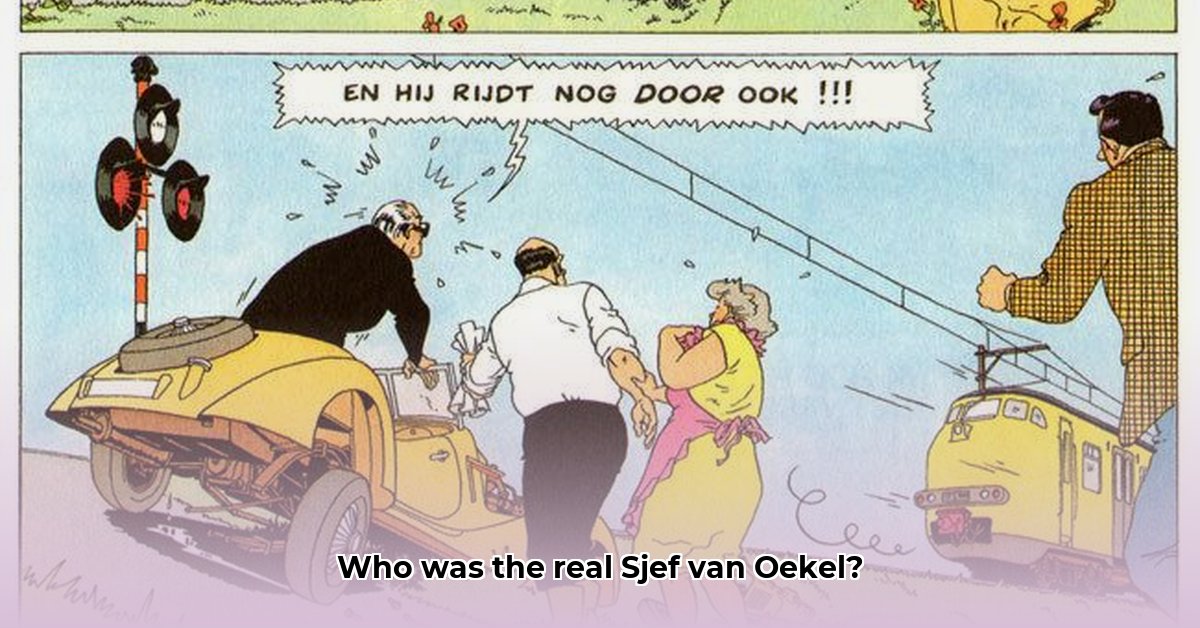
Wie Was De Man Achter Het Personage Sjef Van Oekel?
Remember those oulike characters from 70s Dutch television? Sjef van Oekel, jy weet, the one with the skelm accent and even skelm-er antics. But who was the man behind the madness? Let's delve into this lekker story!
It all started with Wim T. Schippers, a creative genius known for his quirky humour. He dreamt up Sjef, initially with a thick Flemish accent – imagine the gelag! – first appearing in various Barend Servet productions. This was the trial run, the prototype for the legend to come. But the actor, Dolf Brouwers, truly brought Sjef to life. His performance was alles; without Brouwers, Sjef would just be a name on a page.
Sjef's TV career wasn't overnight success, mind you. His early appearances were small, almost cameos. But something clicked. His uniquely absurd humour resonated. Phrases like "reeds," "pardon reeds," and "dat ben ik dus" became part of everyday conversation – you'd hear them everywhere! The game-changer was "Van Oekel's Discohoek," a hilarious satire of the popular music show, "AVRO's Toppop." It was a massive hit! Imagine almost every household in the Netherlands knowing and loving Sjef – that's how popular he became. His enduring appeal, particularly among students, was incredible.
Then came the comic strip. Schippers, with artist Van den Boogaard, decided to bring Sjef to the printed page. But things took a turn. The comic book Sjef differed significantly from his TV counterpart. Was this a creative choice, or an attempt to attract a different audience? Whatever the reason, it resulted in a legal battle between Brouwers and Schippers – a clash of creative differences that escalated into a legal dispute. This legal wrangle highlighted the complex world of intellectual property rights and the tension between artistic vision and profit. It begs the question: was this conflict really necessary? Could better communication or clearer agreements have prevented it?
Sjef van Oekel's impact is still felt today. He's more than a funny character from the past. He represents a time of incredible creative freedom on Dutch television. He also embodies the often-complicated relationship between creative ideas and legal realities. You still hear those tunes, like the catchy "Zuurkool met vette Jus," evoking a wave of nostalgia. His continued popularity sparks debate about his relevance today. Is he still relatable? Some would argue emphatically yes, others might say his charm is primarily nostalgic.
Let's break down Sjef's journey:
- Character Development: Sjef evolved from a minor character with a Flemish accent to a national icon with instantly recognizable catchphrases. This evolution illustrates the power of skilled character development and memorable performances.
- "Van Oekel's Discohoek": This satirical parody was a massive hit, showcasing Sjef's ability to find humor even in mainstream trends. It cemented his place in culture and demonstrated his talent for connecting with the zeitgeist.
- The Comic Strip Controversy: The significant differences between Sjef's TV and comic book personas highlight the challenges of adapting characters across media, the complexities of intellectual property, and the importance of clear contracts.
So, Wie Was De Man Achter Het Personage Sjef Van Oekel? It wasn't just one person. It was the perfect blend of Schippers's imagination and Brouwers's performance. Their collaboration created an iconic character whose legacy continues to captivate. Sjef van Oekel's enduring charm is a testament to how television can forge moments that become etched in our collective cultural memory. Wat dink jy? What aspects of Sjef resonate most with you? The conversation continues!
How to analyze Sjef van Oekel's impact on 1970s Dutch television ratings
Key Takeaways:
- Sjef's popularity extended beyond television, influencing music charts and comic sales.
- His comedic style, a blend of sophistication and absurdism, resonated deeply with viewers.
- The character's success triggered a significant legal battle over rights and compensation. Analyzing his influence requires examining his cultural context and reception among viewers.
The Birth of a Star: Sjef van Oekel's Rise to Fame
Wim T. Schippers' creation, Sjef van Oekel, wasn't an instant success. He initially appeared in De Fred Hachéshow. But it was his own segment, Van Oekel's Discohoek, that catapulted him to stardom. This segment isn't just about the laughs; it's key to understanding that period of Dutch TV. What made him connect? His unique blend of refined gentleman and absurd chaos.
More Than Just a Laugh: Cultural Impact and Controversy
Sjef was everywhere. His songs, like "Vette jus," topped the charts. A comic book adaptation further amplified his popularity. However, this success came at a cost. Dolf Brouwers sued Schippers over rights and compensation. This legal battle exposed the complexities of the creative industry. How do we balance artistic expression with fair compensation for performers? A question still relevant today.
Understanding the Numbers: Analyzing TV Ratings
Analyzing Sjef van Oekel's impact on 1970s Dutch television requires a contextual approach. We need to compare Van Oekel's Discohoek's ratings to others at the time. What set Sjef apart? Was it his unique humour? Did the controversy actually boost viewership? Analyzing the media's response is equally crucial. What did newspapers and magazines say about the show and its ratings?
Beyond the Screen: Sjef’s Enduring Legacy
Sjef van Oekel remains unforgettable. He challenged norms. He ignited conversations. He became interwoven into Dutch language and culture. His legacy embodies the power of comedy to transcend time. But it also serves as a cautionary tale about the dynamics within the creative industry. What lessons does his story hold? It reveals much about the relationships between artist, performer, and audience.